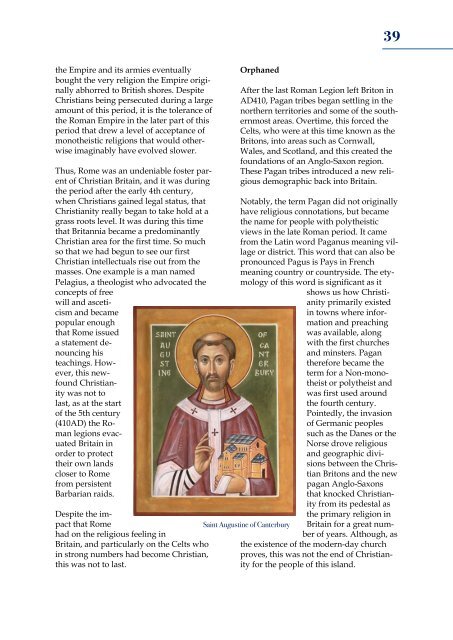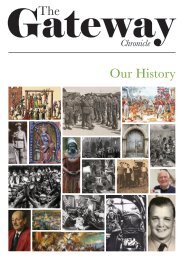You also want an ePaper? Increase the reach of your titles
YUMPU automatically turns print PDFs into web optimized ePapers that Google loves.
39<br />
the Empire and its armies eventually<br />
bought the very religion the Empire originally<br />
abhorred to British shores. Despite<br />
Christians being persecuted during a large<br />
amount of this period, it is the tolerance of<br />
the Roman Empire in the later part of this<br />
period that drew a level of acceptance of<br />
monotheistic religions that would otherwise<br />
imaginably have evolved slower.<br />
Thus, Rome was an undeniable foster parent<br />
of Christian Britain, and it was during<br />
the period after the early 4th century,<br />
when Christians gained legal status, that<br />
Christianity really began to take hold at a<br />
grass roots level. It was during this time<br />
that Britannia became a predominantly<br />
Christian area for the first time. So much<br />
so that we had begun to see our first<br />
Christian intellectuals rise out from the<br />
masses. One example is a man named<br />
Pelagius, a theologist who advocated the<br />
concepts of free<br />
will and asceticism<br />
and became<br />
popular enough<br />
that Rome issued<br />
a statement denouncing<br />
his<br />
teachings. However,<br />
this newfound<br />
Christianity<br />
was not to<br />
last, as at the start<br />
of the 5th century<br />
(410AD) the Roman<br />
legions evacuated<br />
Britain in<br />
order to protect<br />
their own lands<br />
closer to Rome<br />
from persistent<br />
Barbarian raids.<br />
Despite the impact<br />
that Rome<br />
had on the religious feeling in<br />
Britain, and particularly on the Celts who<br />
in strong numbers had become Christian,<br />
this was not to last.<br />
Orphaned<br />
After the last Roman Legion left Briton in<br />
AD410, Pagan tribes began settling in the<br />
northern territories and some of the southernmost<br />
areas. Overtime, this forced the<br />
Celts, who were at this time known as the<br />
Britons, into areas such as Cornwall,<br />
Wales, and Scotland, and this created the<br />
foundations of an Anglo-Saxon region.<br />
<strong>The</strong>se Pagan tribes introduced a new religious<br />
demographic back into Britain.<br />
Notably, the term Pagan did not originally<br />
have religious connotations, but became<br />
the name for people with polytheistic<br />
views in the late Roman period. It came<br />
from the Latin word Paganus meaning village<br />
or district. This word that can also be<br />
pronounced Pagus is Pays in French<br />
meaning country or countryside. <strong>The</strong> etymology<br />
of this word is significant as it<br />
shows us how Christianity<br />
primarily existed<br />
in towns where information<br />
and preaching<br />
was available, along<br />
with the first churches<br />
and minsters. Pagan<br />
therefore became the<br />
term for a Non-monotheist<br />
or polytheist and<br />
was first used around<br />
the fourth century.<br />
Pointedly, the invasion<br />
of Germanic peoples<br />
such as the Danes or the<br />
Norse drove religious<br />
and geographic divisions<br />
between the Christian<br />
Britons and the new<br />
pagan Anglo-Saxons<br />
that knocked Christianity<br />
from its pedestal as<br />
the primary religion in<br />
Saint Augustine of Canterbury Britain for a great number<br />
of years. Although, as<br />
the existence of the modern-day church<br />
proves, this was not the end of Christianity<br />
for the people of this island.


















